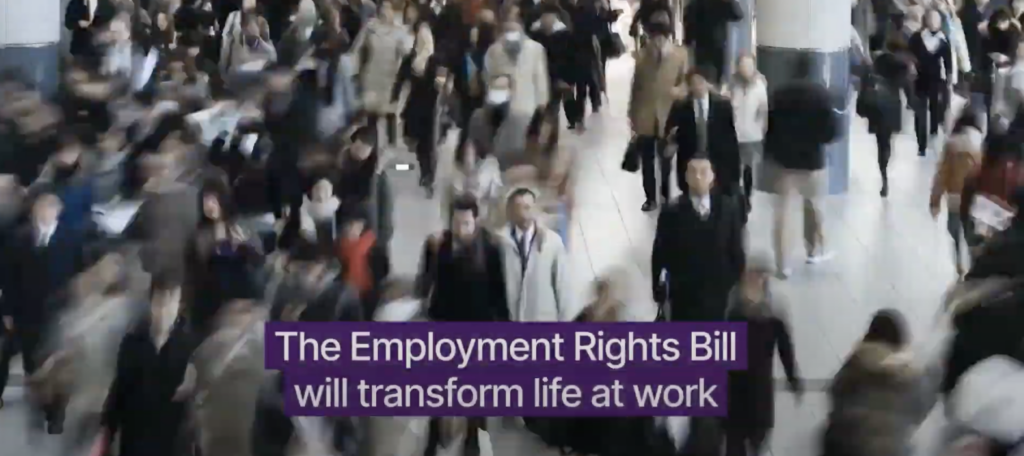 Labour’s employment rights bill, currently progressing through Parliament, has received praise from many on the left, with employment lawyers describing it as a once-in-a-generation change to employment laws. As one overexcited lawyer remarked, “The new Employment Rights Bill introduced by the UK government represents one of the most significant single items of employment legislation ever to be published.”
Labour’s employment rights bill, currently progressing through Parliament, has received praise from many on the left, with employment lawyers describing it as a once-in-a-generation change to employment laws. As one overexcited lawyer remarked, “The new Employment Rights Bill introduced by the UK government represents one of the most significant single items of employment legislation ever to be published.”
Well, let’s not get too carried away. The reality is that the bill primarily aims to strengthen individual employment rights to counter some of the worst excesses of employers since the decline of militant trade unionism. Under the bill, so-called “hire and fire” practices will be outlawed, along with zero-hours contracts. The right to claim unfair dismissal will also become a “day one” right for employees, in contrast to the current law, which requires individuals to have been employed for two years before they can claim unfair dismissal.
The right to claim unfair dismissal is arguably the most important of all individual employment rights, as, apart from strike action, it is the only means through which employers can maintain control in the workplace—a situation whereby employees must either comply with orders or face dismissal. Although the right to claim unfair dismissal is a poor substitute for strike action, reflected in the fact that the Tory government first introduced it in 1971 to undermine wildcat strikes aimed at reinstating dismissed workers, any strengthening of rights that challenge employer power should be welcomed.
As with any government proposals that purport to weaken employers’ power, the devil is in the detail. The bill proposes a probationary period—expected to last nine months—during which it will be significantly easier for employers to dismiss workers without facing an unfair dismissal claim. Thus, the government’s claim that it is a “day one” right does not hold water, making Labour’s proposals on unfair dismissal less radical than suggested, particularly given that for many years, the qualifying period for the right to claim dismissal was just six months without any complex probationary periods.
Moreover, while the bill asserts that the aim should eventually be to move towards a single status of worker, no concrete proposals have been made. As a result, millions of casualised workers whose employment status is that of “worker” will still be denied the right to claim unfair dismissal. This omission is likely to lead to further casualisation as employers, no doubt ably assisted by the judiciary, seek to circumvent the bill’s unfair dismissal laws.
The proposed employment bill does expand individual employment rights in several other areas. For example, laws relating to sexual harassment will be strengthened, and new protections will be introduced for pregnant women and new mothers returning to work. Statutory sick pay will also be enhanced, with adjustments to the lower earnings limit and the elimination of the waiting period, enabling workers to claim sick pay from the first day of illness. Additional rights include the Right to Switch Off, which prevents employees from being contacted outside working hours, as well as strengthened laws on collective redundancy and making it harder for employers to refuse requests for flexible working.
While the strengthening of individual employment rights is to be welcomed, the Labour government’s proposals are hardly earth-shattering, and the rights they introduce are already the norm, if not superior, in most European countries. Even so, readers will not be surprised to learn that employers are vehemently resisting the proposed changes and are pressuring the government to amend the employment rights bill. Coming to their aid are both the Conservatives and the ever-so-nice and cuddly Liberal Democrats.
In the latest debate on the bill in the House of Lords, the government suffered five significant defeats at the hands of Conservative, Liberal Democrat, and cross bench peers. These defeats included voting in favour of an amendment on zero-hours contracts, opposing Labour’s proposal to compel employers to offer guaranteed hours from day one, and rejecting the government’s plan to make unfair dismissal a day one right. The employment rights bill will now return to the House of Commons for further debate.
A notable omission from the government’s Employment Rights Bill pertains to anti-strike laws. The only firm commitment included in the bill is the repeal of the 2023 Strikes (Minimum Service Levels) Act, which required trade unions to maintain minimum service levels during strikes in several key industries. This Act was so evidently anti-democratic that even many employers opposed its implementation.
The repeal of the 2023 Act will still leave intact all the other anti-strike laws introduced by the late, beloved Margaret Thatcher, which have made the laws governing strike action in the UK the most draconian in the Western world. Had the Labour government restored the right to strike by repealing all existing anti-strike laws, we would truly have been discussing the Employment Rights Bill as a landmark piece of legislation for a generation.
The reality is that the Labour government, or any government for that matter, is unlikely to repeal the Thatcherite anti-strike laws unless compelled to do so by the strength of organised labour. The harsh truth is that the draconian anti-strike legislation in the UK will only be overturned if workers come together and challenge the power of employers. Instead of relying on political parties, we must look to each other as workers and get organised.